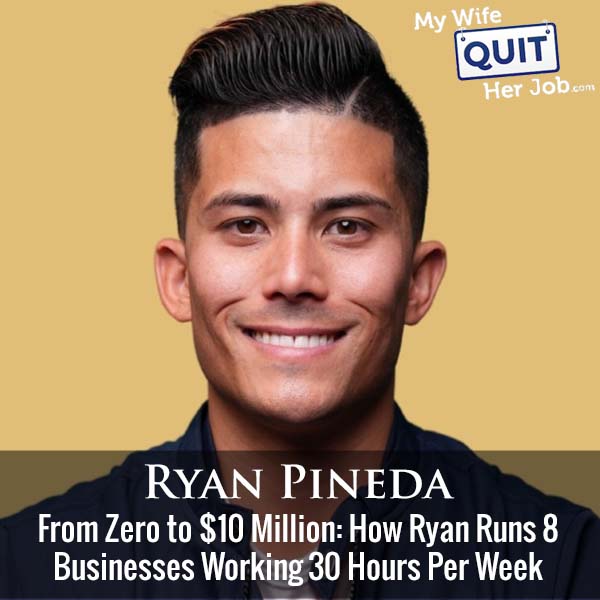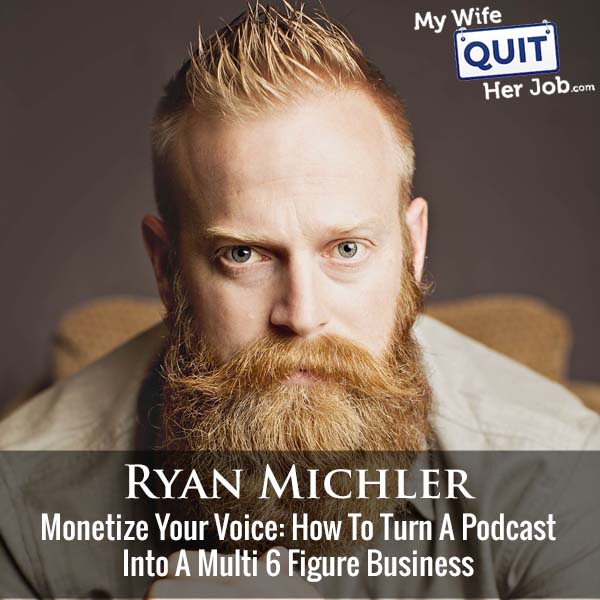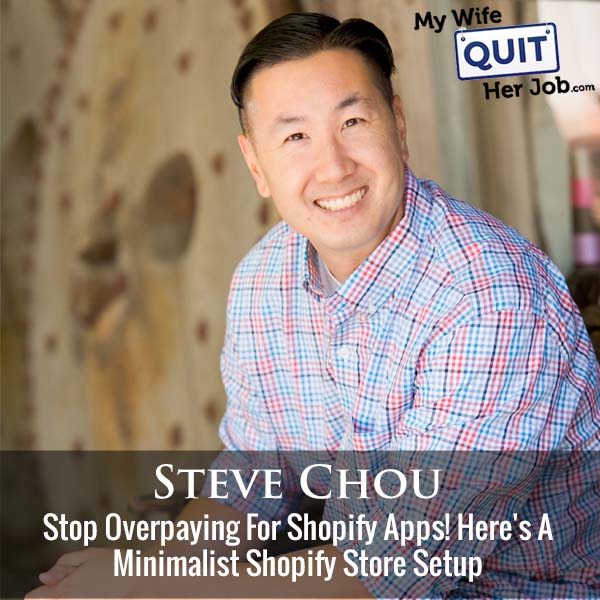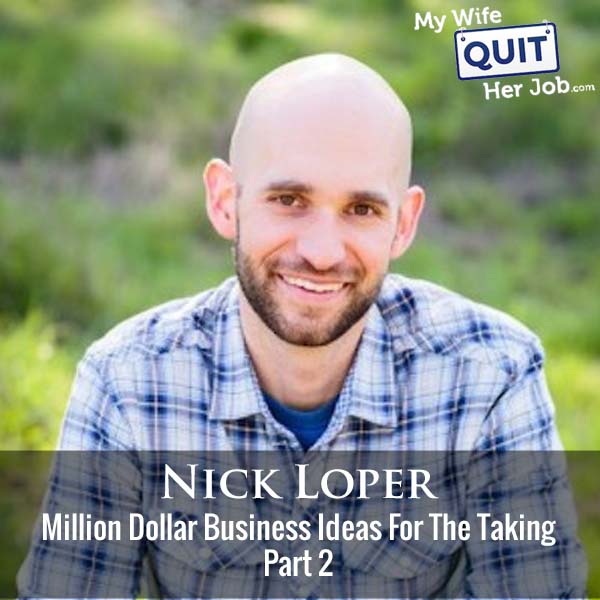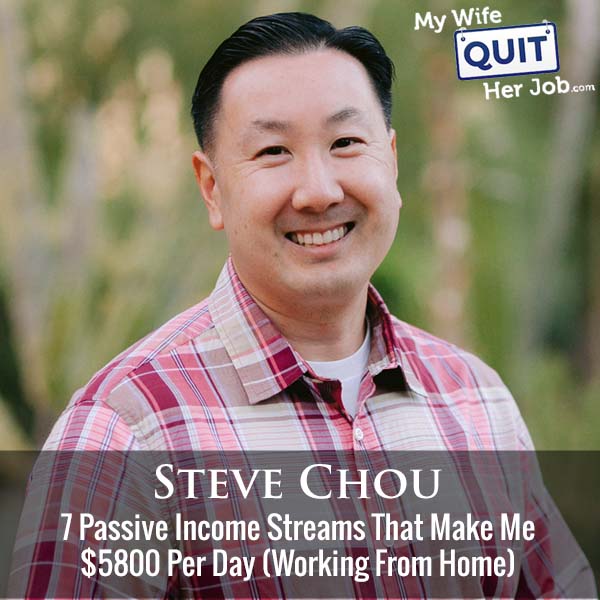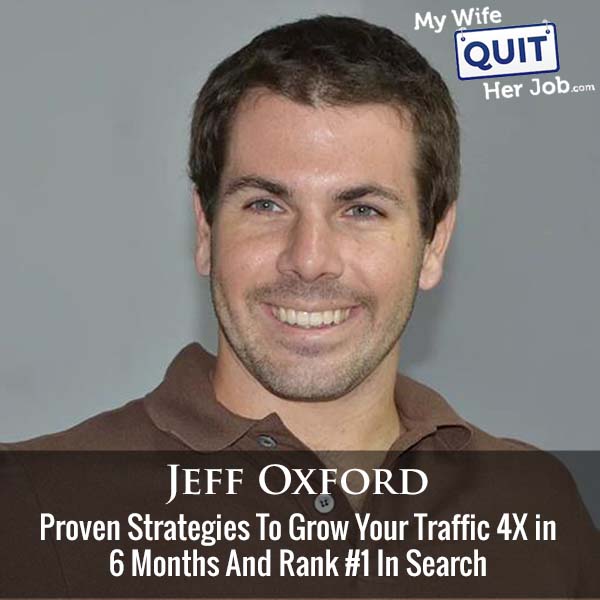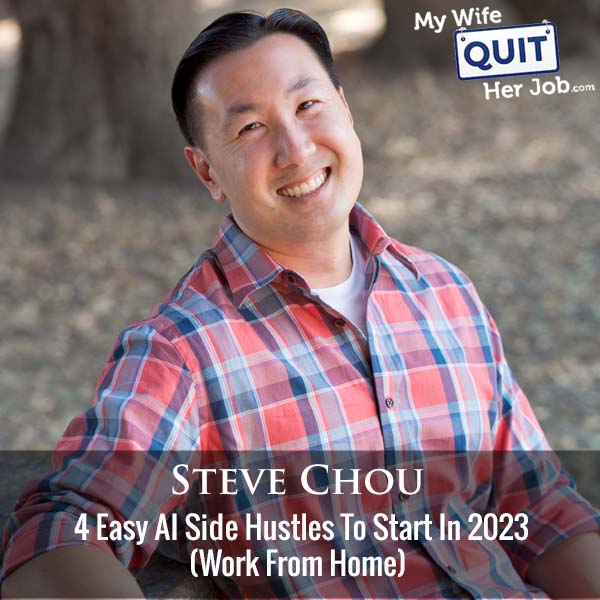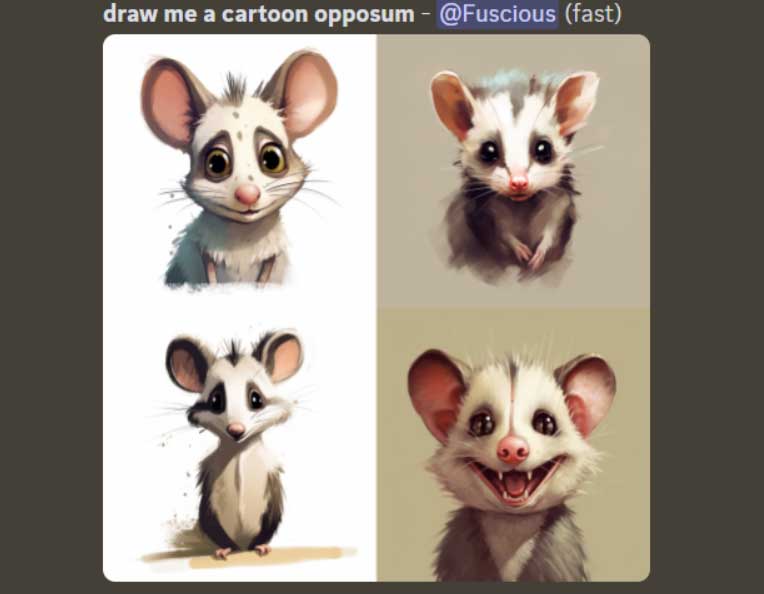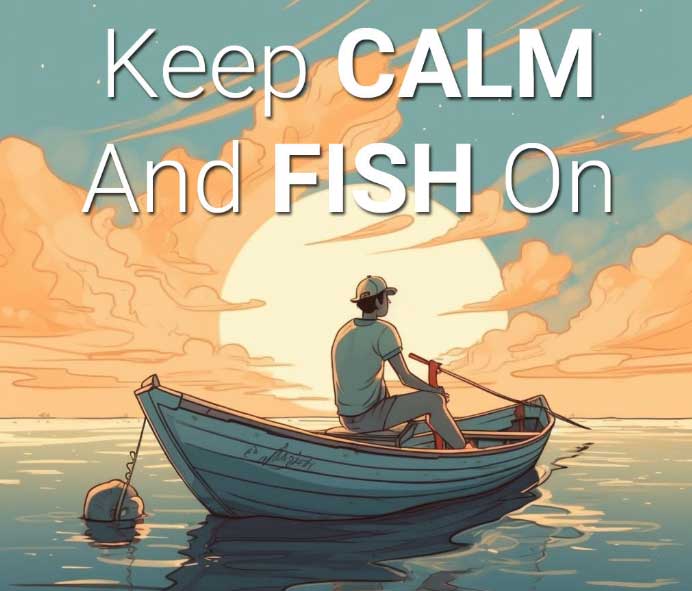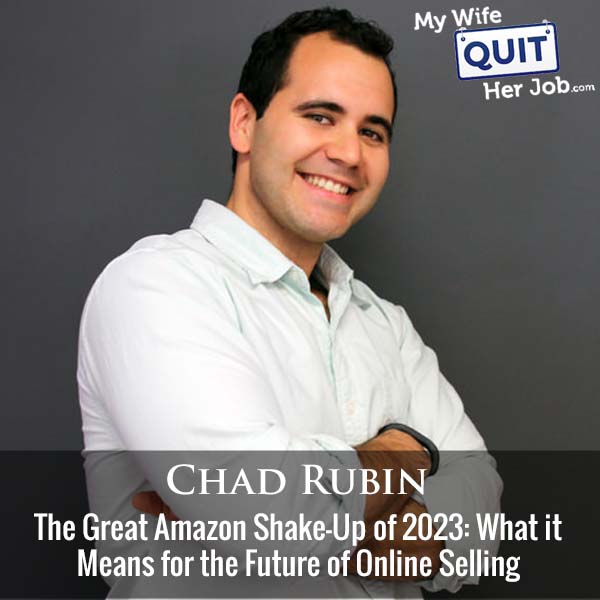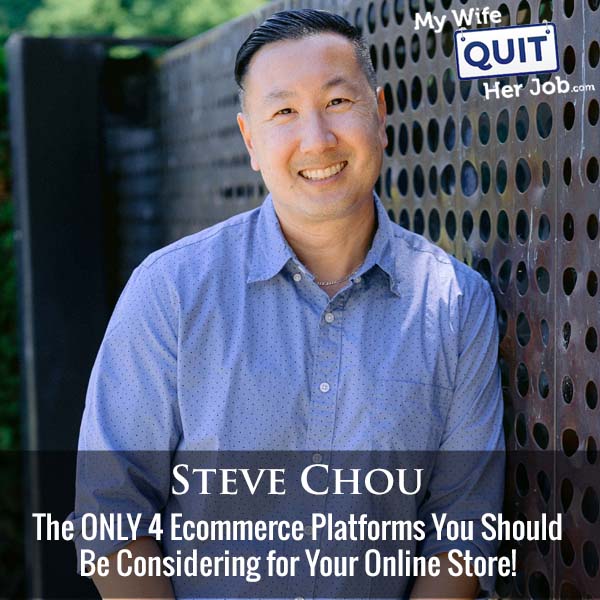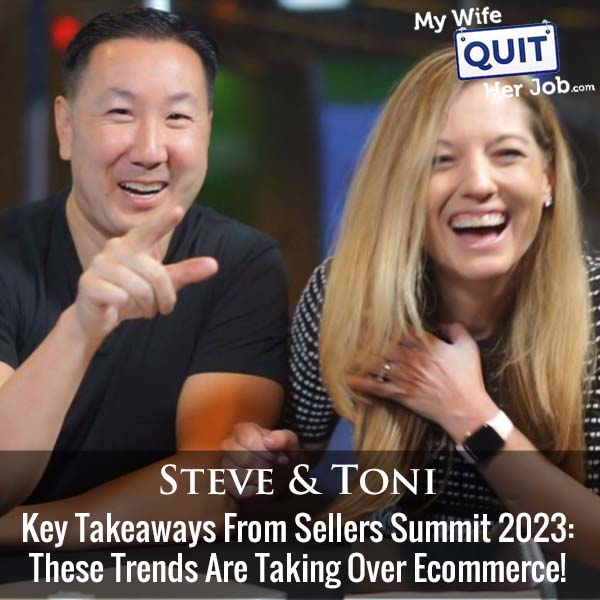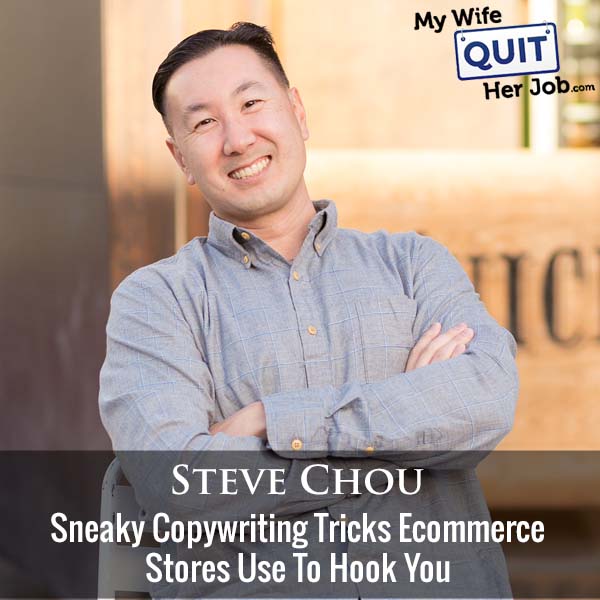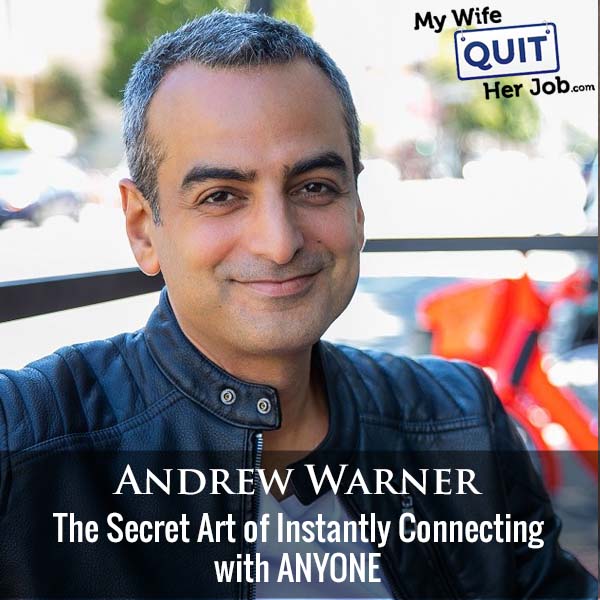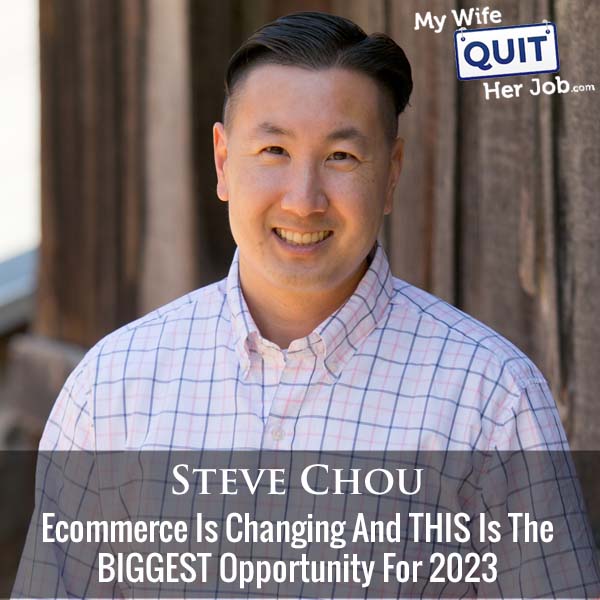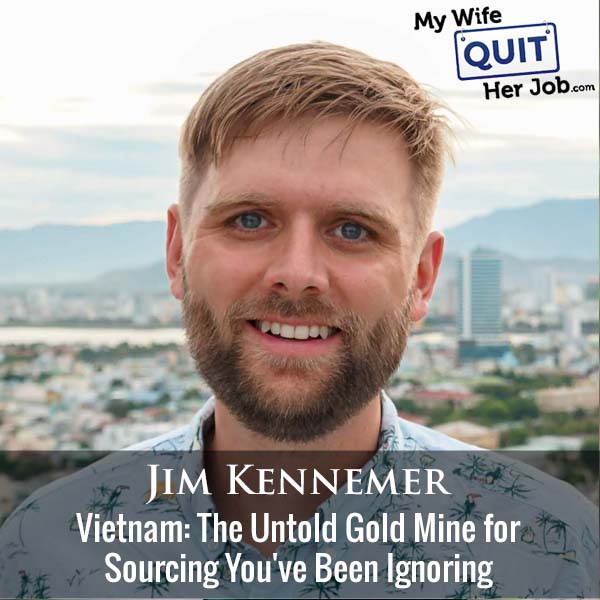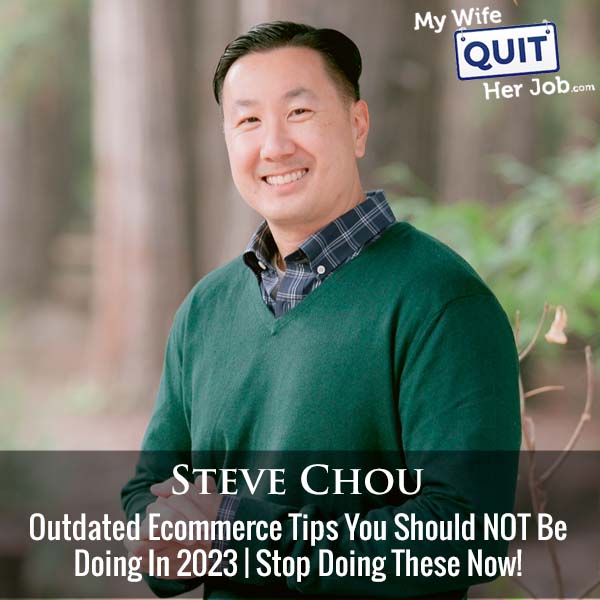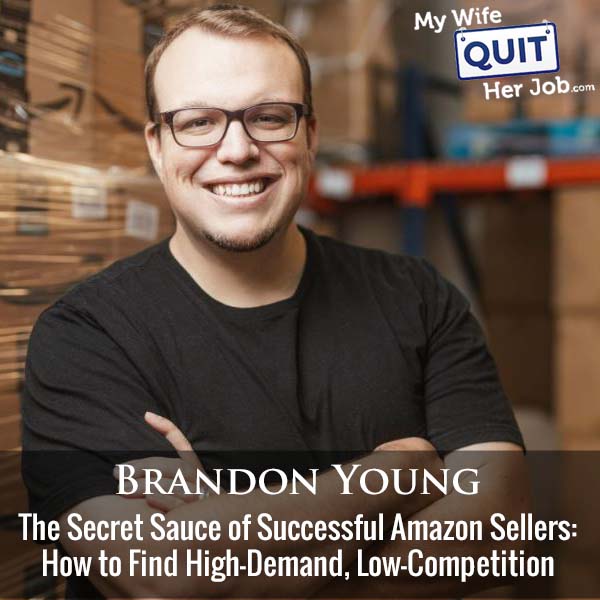Podcast: Download (Duration: 43:35 — 50.2MB)
Today I’m thrilled to have Ryan Pineda on the show. Back in 2015 with only $10,000 in the bank, Ryan started his entrepreneurship journey by flipping houses.
And after seeing success in real estate, he started 5 more businesses generating over $10 million in revenue, working less than 30 hours per week.
In this episode, we’re going to break down all of his income streams and how he did it.
What You’ll Learn
- How Ryan made millions flipping houses
- How Ryan grew his following on YouTube, Instagram, and TikTok to over a million followers
- How Ryan manages 6 separate businesses working only 30 hours per week
Other Resources And Books
Sponsors
GETIDA – GETIDA is the tool that I use to recover lost inventory on Amazon. Right now, GETIDA is giving away $400 in free reimbursements for MyWifeQuitHerJob.com listeners. Click here and try GETIDA for FREE and get $400.
Quiet Light – Quiet Light is the brokerage I trust when buying and selling a business. If you want to know how much your business is worth, then sign up for a free evaluation. Click here to book an appointment with Quiet Light
Transcript
You’re listening to the My Wife Quit Her Job podcast, the place where I bring on successful bootstrap business owners and delve deeply into what strategies are working and what strategies are not with their businesses. Now today I’m thrilled to have Ryan Pineda on the show. And if you’re on YouTube, Instagram, or TikTok, you probably already know who Ryan is because he has a huge social media following. Back in 2015, with only $10,000 in the bank, he started his entrepreneurship journey by flipping houses. And since then he started six businesses generating over $10 million in revenue.
00:29
working less than 30 hours per week. And in this episode, we’re going to break down how he did it. But before we begin, I want to give a quick shout out to Getita for sponsoring this episode. Getita is a tool that basically gives you free money every single month when you sell on Amazon. And I’m not even exaggerating. If you’ve been selling on Amazon FBA for any length of time, you know that Amazon is horrible at managing your inventory and they lose or break your products all the time. In fact, I’m to bet that Amazon owes you a ton of money right now. The problem though, is that in order to get your money back,
00:59
you have to manually track your inventory and manually file for reimbursement. Katita handles all the paperwork for you and takes just 25 % of whatever you get back. So basically you only pay when Katita makes you money, which makes it a no brainer to sign up. Not only that, but Katita is giving away $400 in free reimbursements when you sign up over at mywifequitterjob.com slash Katita. That’s mywifequitterjob.com slash G-E-T-I-D-A. I also want to thank Quiet Light for sponsoring this episode.
01:27
If you’re looking to buy or sell your business, Quietlight Brokerage is my go-to firm to help you get top dollar for your company. I’ve known Joe Valley and the guys over at Quietlight for over 10 years now and I trust and highly recommend their services. So if you’re looking to buy or sell a business, head on over to mywifecoupterjob.com slash quietlight and get a free valuation of your business. Someone from Quietlight will speak to you for free. Once again, that’s mywifecoupterjob.com slash Q-U-I-E-T-L-I-G-H-T.
01:56
Now onto the show.
02:03
Welcome to the My Wife Could Her Job podcast. Today I’m thrilled to have Ryan Pineda on the show. Now, Ryan started his journey in the real estate industry back in 2010, only to discover that it wasn’t what he wanted to do. So in 2015, he took 10K from his bank account and started flipping houses and made millions of dollars. But that was just the beginning. Since then, he started six separate businesses that generate tens of millions of dollars in revenue. And he works less than 30 hours a week running them.
02:33
He’s also amassed over a million followers on social media where he teaches others how to achieve financial freedom. So in this episode, we’re going to break down what some of these businesses are and how he’s able to manage all of them in such a short period of time. And with that, welcome to show, Ryan. How are you doing today, man? What’s up, Steve? Happy to be here, man. Yeah. So I was looking on your website and I think you got more than six things. In fact, it kind of makes me a little dizzy.
02:58
You got a real estate investing course. I think you got an NFT project. Yeah, your own coin called tycoin. think business building class and agency and accounting agency. You even do a little bit of e commerce wholesale and investment group and a media company and 30 hours a week. How big is your team? Like how are you able to do all this stuff? Yeah, I think across all the companies we’re close to you know, 80 to 100 employees. Ah, okay. Yeah. Okay. So we got a lot of people.
03:27
I was just gonna say I have problems keeping up with two seven figure businesses, let alone the eight that you have. Are you particularly passionate about one over the other? Or do you just kind of like, how does one end up with eight? Especially when I’m asking? Yeah, to back up a little bit, I mean, I never considered myself to be an entrepreneur. You know, in my former life, I was a baseball player. You know, I got drafted by the Oakland A’s back in 2010. So
03:56
Oh, I was mainly just focused on being a great baseball player. And I kind of fell into entrepreneurship out of necessity because I had to work during the off seasons, you know, I was in the minor leagues, making 1200 bucks a month, like it was no money. So nobody was gonna give me a job either because I was leaving six months every year and I had to practice and all this stuff. So I had to become an entrepreneur. So, you know, long story short, I get my real estate license in 2010. Absolutely hate it.
04:26
because I just didn’t like working with clients. The commission sucked at that time, prices were low. It was just tough. So eventually gave that up. I started doing other side hustle stuff. Like I was a substitute teacher. I had my real first business success flipping couches actually. know, just like sofas you mean? Yeah, just just buying and selling couches. was like, okay, it was a thing that I just stumbled upon that, you know, at the peak, I was making about eight grand a month net doing that. And I was like, dude, this is a great business.
04:56
So, you know, after doing that for a little bit, I realized like, okay, I’m not gonna flip furniture the rest of my life. Let me find something new. And so I came back to real estate after quitting. And I was like, you know what, instead of being the agent, what if I was the buyer? Like I’ve always been good at finding deals. And so, you know, I started flipping houses, you know, and there’s a lot that goes into that. had to max out my credit cards and all this other stuff. I had to take hard money loans and just really go all in to,
05:25
buy my first deal. And thankfully, it worked out, even with all that risk. And, you know, I made 25 grand and, you know, from there, I just kept buying more and more houses. And that was how I first became successful tie became a millionaire. And it’s what led to all the other stuff because, you know, truthfully, I didn’t really want to do I’m like, you know what, I can flip out the rest of my life like this pretty easy. And, you know, it makes great money. It’s it’s it’s an industry that’s always going to be around. I’m like,
05:54
I could do this. And I enjoyed it. I enjoyed deal making and other stuff. But, you know, during that time, now I started to get more questions of like people wanting to work with me, you know, success attracts success. And so, you know, we started a brokerage for agents, even though I didn’t like being an agent, because I’m like, look, if we’re going to fill up all these houses, we might as well like be the brand behind it. And like, all these people are going to want to join. So we ended up starting a brokerage called forever home realty that
06:23
we scaled to 200 agents before I got rid of it. Then a lot of people were asking me about, hey, how do you flip? Can you train me? And I’m like, dude, I do not want to do education, but let me write this book. So I wrote my first book called Flip Your Future back in 2018. And I created my first course and education company and threw an event and it was like, all right, this is like, it’s fun. But like my bread and butter’s actually flipping the homes.
06:53
So, you do that. And then eventually, you know, I’m still having success and people are like, who’s your CPA? Who’s your accountant? And I’m like, all right, let me, let me go to my guy and see if he wants to start a business. So we start an accounting firm called TrueBooks. And, know, so like those were like the first core businesses, like they just kind of were out of the success from my main business. And then, you know, as I got into social media, I started doing content in 2020.
07:22
more on more opportunities started to come about, you know, from from influence. And so I started a fund and we started buying big apartment buildings, then, you know, I started doing, you know, the NFT project, and it became the number one traded open sea or NFT on open sea, like it was crazy. You know, and I’ve just done a lot of different businesses at this point. And now we train people on, you know, other elements to general business, we train people how to create content.
07:48
You know, we just started the media company you were talking about where we produce content for entrepreneurs like so, you know, basically every business I’ve ever started came from demand that I already knew existed. Like people kept asking me for it. It’s like, dude, when people keep telling you they want to give you money, you’re just like, all right, fine. Let me let me build this.
08:14
You know what’s funny is you originally didn’t like being a real estate agent because you hated clients and it seems like almost all the things that you do involve client work, right? But there’s a big difference. So let me say I still don’t like working with clients. I like doing my own thing. Being like so my problem with being a realtor was like they owned you like you’re a slave to like them. You know, whatever. Right. And you still see it in industries like where that becomes the case. But
08:43
you know, in like our coaching programs now, yeah, we have students and clients, but I don’t have to like hold their hand and I’m not their accountability coach, like, you know, I hop on a call and like they can choose to listen or not. If they don’t want to listen, then whatever, I don’t care. It’s like, you have to be receptive to the information. Now, we do want them to have success because you know, we understand people do need their hands held, they do need accountability. I’m just not the guy doing it. I have coaches who will do that. So got it.
09:13
Okay, you know, it goes back to the real estate brokerage, you know, I built it to 200 agents, I didn’t mind owning the real estate brokerage, because I wasn’t the broker, you know, holding all these agents hands, I didn’t have to go show houses, if I got a lead, I just go give it to an agent, let him deal with it and make some money. You know, like, so, you know, I focus on the things I like to do, which are not usually like one one on one things. And I focus on
09:41
creating the solutions because those things are needed. I just don’t have to be the one to do them. It seems like in some of the businesses that you mentioned, it was all about finding the right partner, right? So you had people requesting accounting services. So you went up to your accountant and said, Hey, you want to start a business essentially? Yeah. Right. So we start, is that generally how you operate? Pretty much. I won’t start a business at this point unless we have an operator in place, right? So we got to have an op
10:09
because I’m not going to be in the day to day period, right? So it’s like when I look at the tax business, I’ve never done someone’s tax returns. Like I’m not sitting on these tax strategy calls, but I own the business, you know, and people trust it because of the brand, you know, that we’ve built, you know, with Pineda Media, the newest one, that one’s a very hands on thing for the entrepreneurs that we manage for their social media, like we hop on a zoom call with them for three hours at a time and pepper them with questions and try to coach them through
10:38
speaking and creating great content, and then we edit it for them and, you all this stuff. And it’s very, I would say it’s probably one of the more high maintenance things because like, this is their social media, this is their like personal brand and how they’re, you know, appearing to the world. So I think people are even more nitpicky with something like this. Yeah. And we’ve got people who are like, they like to help them. And they like doing that stuff. But it ain’t me. So let me ask you this. So if you’re starting these businesses,
11:08
and you’re not the operator, presumably your main value add is the lead flow, right? Coming into business. Yeah, I think I have probably I would say there are three elements that are why people want to partner with me, right? So number one, yeah, the marketing side of things like my, my own organic reach, like, or funneling them in from my other businesses, right? Because if somebody joins my education business, they need tax either way, right? So the fact that I own this business,
11:37
is a funnel to that business. And then my organic marketing will get trafficked. So like that, that’s obviously a huge thing. But you know, as I’m like starting to grow more in business, I’m starting to like, try and get away from that because I can only promote so many things. Yeah. So, you know, when people come to me now about partnership, I’m really not trying to be the promoter or the face, you know, the second way that we really add value is just through like the actual strategy and consulting and the resources like
12:07
the fact that we know how to build funnels and websites and ads and sales teams and hire like we know all of that at a very high level. We know how to scale companies, right? So if you come to us, we’re gonna put the pieces in place to build machines really, right? Like that’s what I’ve built is a bunch of machines. And so we’re gonna turn your business into a machine. And, you know, it’s gonna be a machine that doesn’t need my face on it. Like it can be a machine without me.
12:36
So like people partner up for that reason. You know, and then the third reason I would say is just capital, right? Like, I mean, we have capital if like, somebody’s looking for an investment, you know, and it makes sense. We’ll do that, right? Like our newest thing is called Panada Partners because it’s like, we want to partner up with more businesses at this point. Like I don’t want to necessarily start, like everything that I own to this point, I’ve started from zero. And you know, it’s like, we can do it. We’ve proved it time and time again, but it’s hard.
13:06
You know, like it’s easier to go take something established and blow it up. Yeah. Interesting. So for the people listening to my podcast, some of them probably haven’t started anything yet. So out of all the businesses that you’ve started and run, let’s say you were to start over from complete scratch. What would be attractive to you today and something that you’d stick with for at least, let’s say, three to five years? I mean, I love real estate. Look, as much as I said, I didn’t like it.
13:34
I didn’t like it as an agent, but I love it as an investor. It’s an industry that anyone can get started on today. You don’t need any kind of special skills or experience. You don’t even need a lot of money. Like there are ways to do real estate without using any of your own money. And it’s a skill that builds wealth. Like at the end of the day, you are going to build wealth through real estate if you hold it for the long haul, right? So to me, what I teach is there are really three pillars that you can build your wealth on.
14:03
Number one is business, right? You could start a business and build it up and like, that’s gonna make you money, okay? Number two is investments, okay? You can just become a very good investor, somebody who’s savvy and like, you make great deals and that’s how you grow your wealth. The third is influence. So if you become great on social media and you have influence, you’re gonna build a ton of wealth. You’re gonna get opportunities, you’re going to get just money flowing to you because attention is currency.
14:33
So, you know, at the end of the day, like, if you can do just one of those, you’ll become really wealthy. But if you could do a mix of those, you’re gonna, you’re just gonna kill it. Let’s talk about the influence factor, because I’ve seen you in a lot of places. I think you’re on YouTube, I see you on TikTok all over the place. And you’re pretty prolific. It’s it looks like you’re putting out multiple pieces of content per day. Is that accurate? We put out about 40 to 50 pieces per day. Okay, that’s nuts. Let’s talk about that.
15:03
So that sounds like a lot of time, but I presumably you probably produce one thing and you break it up into multiple pieces. So let’s talk about your process. Yeah, I mean, I probably spend 10 hours a week filming. that it’s not a ton. You know, that’s that kind of output or input creates the output I’m talking about. mean, because, you know, if you think about it, right, like podcasts are like kind of my favorite thing to do. And I like it because it’s informal. I don’t have to prepare. I just talk and it’s great.
15:32
And then we cut those up into different clips and we post those across all the different platforms. They then take what I say and they turn them into tweets, you know, they turn them into blog posts. Everything’s coming from my mouth. It’s just, you know, they’re taking what they think is great. And it’s a machine. It’s a machine like any other business of like, yo, I put in what I got to put in and they do the rest. if you were starting out like you were before when you were
16:01
kind of in debt and you had to borrow money and max out your credit cards. Just walk me through the process from scratch. So let’s say, would you start with a podcast? So if you’re broke and you’re trying to gain influence or make money, like what’s your goal? Well, I think influence leads to money, right? So the first step would be to build that influence, right? You know, I’ve debated about this, you know, because when I was broke 10 years ago, influence wasn’t
16:28
what it is today, right? right influencers are getting, you know, a lot more powerful than even most. So obviously, I think it’s a great tool. But what I would probably tell somebody who’s broke is, pick a tool that you’re naturally good at, right? So, you know, if you’re a great deal maker, and you’re a great salesperson, like I think business is an amazing thing, you should start a business. If you’re
16:56
great crunching numbers and investments, everything else, maybe you should try and get in the investment world of real estate or stocks or whatever. If you’re great on camera, you’re charismatic and you’ve got some interesting things to say, I would say the number one thing in influence is being creative. Like if you’re a creative person, then, you know, influence is the route. You know, I didn’t start with influence. I started with just investing. just bought real estate and that was how I, you know, whatever. And then I started to learn how to run a business.
17:24
because of real estate. And then I started other businesses. And then I got into influence later. And, you know, it made influence so much easier because I had things to talk about. You know, I had credibility at that point. So sure. Yeah, that makes sense. Yeah. You know, it doesn’t mean you can’t start from zero and just start making videos. You absolutely can people there are people who, you know, crush it who have no like, credibility yet. They’re just great content creators.
17:52
there’s nothing wrong with that. You just got to own it. You just got to be like, yeah, you know, like this is my journey. Like, and I’m trying these new things and I’m trying to make it and I’m documenting the journey. I think that’s amazing. So, you know, if I was broke, I would probably be doing a hybrid of trying to build a business, but I’m also going to document myself trying to build the business.
18:15
If you haven’t picked up my Wall Street Journal bestselling book, The Family First Entrepreneur yet, then now is the time. My book will teach you how to achieve financial freedom by starting a business that doesn’t require you to work yourself to death. After all, most online business gurus constantly preach that you have to hustle, hustle, and hustle some more just to get ahead. Well guess what? It turns out that you can achieve financial success without being a stranger to your kids. You can make good money and have the freedom to enjoy it, and you don’t have to work 80 hours a week.
18:45
and be a slave to your business just to make it all work. I will teach you how to start a business from the perspective of a parent who makes both business and family work. Not only that, but I’ve made it a no-brainer to grab the book because I’m still giving out $690 in free bonuses. And here’s what you get. You get instant access to my three-day print-on-demand workshop. In this workshop, I’ll teach you exactly how to get started running a print-on-demand e-commerce store, and I provide you with a free website theme as well.
19:13
You also get access to my two day passive income workshop where I’ll teach you how to make money with blogging, podcasting, or YouTube. Go to mywifecoderjob.com slash book and I’ll send you the bonuses right away. Once again, that’s mywifecoderjob.com slash book. Now back to the show.
19:31
Your path you mentioned you maxed out credit cards and you had to get some hard money loans. Would you have taken that path again? Like you mentioned investing and that requires capital, right? Yeah. I mean, yeah, 100%. I mean, I like where it turned out, right? But yeah, it turned out great, but it’s risky, right? I mean, let’s say the downturn happened right after you did that. It would have been tough.
19:55
I actually don’t think it was risky at all. And here’s why. Oh, really? Okay. Yeah. This was my mindset going into it. Right. And I think a lot of young people struggle with this. So Steve, how old are you? I’m 48. You’re 48. And you got wife, kids. Yep. Yeah. So like, if you were to lose it all today, it’d be very like catastrophic. And so you know, as you get I don’t think so, actually, because once you know how to make money, it’s not a big deal. Yeah. But yeah, you’ll remake it and you’ll be fine. Right.
20:25
Yeah, but you know, whatever, it’ll suck for a period of Yeah, and yes, whatever. The thing is, like, as you get older, and you you make more money, and you have more to lose, then yes, things get riskier, because you have more to lose, even though your skills are so much better. Right. And also to the value of whatever you’re investing in or putting your times towards, like every dollar you build has least it has less value to you.
20:53
know, your first million dollars is so important, compared to if you’ve made 100 million, what’s another million, it doesn’t really matter. So, you know, it’s just this kind of weird thing where money is very important to you early on, and it becomes less important to you later. And therefore, you shouldn’t try to maximize return later, you should maximize risk. And you know, it’s like, man, adding another dollar doesn’t really matter. I’d rather just make sure I don’t lose this money. Right? That’s something to think about. But
21:23
When I was starting out, I was young, I was 24 years old, my wife was 21. And that’s when we got married. And, you know, we’re broke, right? And so for me, it’s like, all right, well, we’re broke. Let’s, let’s look at the scenarios here, we, we can continue on the path we are currently on, which will lead to continuing being broke. So like, that’s 100 % certainty, or we take a risk.
21:52
and we try this house flipping thing. Now what happens if we try this house flipping thing? Well, there’s lots of scenarios that can happen. You know, as an optimist, the best case scenario is we flip it, we go make 25 grand and it’s gonna be great, right? That’s the best case. What’s the, maybe likely case what could happen? Well, maybe we buy it and we realize like we screwed up on some things and we break even or we lose a little bit of money, right? And so it’s like, all right, there’s probably like a…
22:20
70 80 chance that I’m either breaking even or doing good like that’s probably what it is and Remember I was a realtor before so I still had real estate experience like I understood values then there’s probably a 20 % chance of like catastrophe Where things that the fan I totally bought wrong I can’t sell the house and I’m gonna go lose 20 grand or I’m gonna get foreclosed on or
22:47
you I’m gonna lose the house and now I’m 50 grand in debt and like, that is what it is. All right, well, let’s just think what happens at this worst case scenario at 24 years old, I just freaking declare bankruptcy. And I start fresh in two years, whoop dee doo, you know, right. So to me, I had nothing to lose at that point. That makes sense. I everything to gain. And this is what I try to tell young entrepreneurs all the time. Like, dude, I cannot afford to
23:16
buy your coaching program or somebody else’s I don’t have the money. And I’m like, you have credit cards? Can you get debt? They’re like, Oh, well, yeah, but I’m not gonna I can’t go into debt. And I’m like, dude, what do you think real estate is? Yeah, real estate, you’re going into debt. A credit card is no different than a mortgage or student debt is debt. It’s just a matter of how you use the debt. If you use the debt to go make more money, whether it’s through education or an investment or a business, then it’s not debt. It’s just it’s
23:46
it’s a tool. And so, you know, I tell them, I’m like, Well, you know, what’s the worst that happens? You’re in debt, and you didn’t get what you needed to get done. Like, I know what we teach is legit. So it’s on you if you don’t do it, right. But yeah, if you make a mistake, at least you’ll have made a mistake. And you’ll have learned from it. And then you’ll be able to go do it better the next time, right? Like, you will now have experience and you’ll be able to
24:14
to figure it out again. And we’ve had students who do that. Like not everyone makes money their first deal, right? Like they make mistakes. And they’re totally like the most successful people are like, dude, this is great. Like, I’m glad I went through that. Now I know. And so yeah, when you’re young and you’re broke, you should go into debt. You have nothing to lose. Zero is the same as negative 10,000 or negative. I agree with that. Actually. I agree with that. Do you have kids, Ryan? Yeah, I have a third on the way. Okay. Wow. All right. So
24:43
Just by nature of the content that I put out and the fact that my blog and podcast is called My Wife Quit Her Job, I actually attract a lot of females over the age of 35 who have kids. So that advice is great for someone young. Let’s say you’re broke and you have kids and responsibilities. How would your advice change? Yeah, and this is what I wanted to bring up as you get older, you your risk tolerance becomes more strict, right? That’s just natural.
25:10
when you have more responsibility with kids and a spouse and everything else, like you can’t make the same reckless decisions that you would make when you’re single or when you’re you don’t have kids and you’re you’re not young. So in my particular situation, I felt like I had no risk even though most people wouldn’t have did that. Yep. Yep. Now when you’re talking about a, you know, 35 year old woman who’s got a few kids and I you know,
25:37
does her husband work? Like, I mean, there’s context to every situation. Sure. don’t Yeah, of course. Right. Yeah. But I would think, you know, if you’re married, and your husband’s working, and you’re staying at home, because that’s the title of the podcast, my wife’s a stay at home mom, too. You know, you trying a side hustle, I think has no risk, right? Like, I agree. Why are you not if money is tight for the family, and your husband works a normal W two that it is what it is, then I
26:06
There’s so many ways to make money online and still be a stay at home mom. Like I don’t think there’s any reason you can’t try and put some effort into a side hustle. And I think it has very little risk. So the question is, what would you try? Cause you’ve done a lot of things, right? It goes back to all those three pillars, right? It’s like, okay, you’re either going for influence. You’re going to start a business or you’re going to start investing. But presumably you wouldn’t have taken that hard money loan now with three kids, right? And you didn’t.
26:35
and you just had a regular job? I mean, I’m a risky person by nature. I’ve, I’ve, okay, well, also, too. I’ve never had a job. So I don’t even know. Like, it’s just an, it’s just an area that would never play out. The only job I ever had was with the Oakland A’s when they signed me. And that was it. Everything else, like, I was hustling. But look, if I had a job, and three kids, and, you know, we are living paycheck to paycheck, my wife wasn’t working, let’s like put myself in like the
27:05
maybe a standard situation that people have to make a decision on. For me personally, okay, I always look at the future. I’m very like, man, where am I going? If I’m not on the path of where I want to be, and I know that this current path I’m on is going to lead me to something I don’t want to be, then I cannot stay on this path. There’s no there’s no reason to stay on this path. And so if you’re at a job, and I want to say a dead end job, but like if you’re at a job that’s like,
27:35
you know, this is not going to be the path for where you want your family to be, then it is your obligation to switch the path. Now, you don’t have to switch and just like, quit your job tomorrow. I’m not saying that. But I am saying you need to start forging a new path as you start to transition because your current path is wrong. So, you know, if I was this guy who was working a job and paycheck to paycheck, I didn’t want my wife to work because I wanted her to take care of the kids and everything else.
28:05
then I would be spending every waking moment that I had available to me like learning a new skill. Okay. And whatever that skill was content, real estate, side hustle, online business. I don’t give a crap. You want to flip couches. Cool. But you know, you got to want it bad enough. I don’t care who you are today. I mean, if you work 60 hours a week at your current job, I mean, cool. You can still learn skills. How many hours are in a week? I don’t know.
28:33
but you got time to go learn new skills. And so that’s what it’s gonna take. You’re gonna have to learn a new skill one way or the other if you wanna get out of your situation. It’s not gonna magically change. You can’t just hope for a raise. You you can’t just, you gotta forge a path and there’s lots of tools available. Yeah, the reason why I’m asking all these questions is I get them all the time. So I run a podcast, I have a YouTube channel, blog, and I also run an e-commerce store with my wife that sells handkerchiefs. And I’m always asked,
29:01
You know, out of all the things, I also run an event. So out of all the things that you do, you know, which one would you do in this certain situation? And my answer usually is like the content side can take a while. Yep. Right. I say maybe two or three years if you want to go down that path. If you need money sooner than that, then just selling something like you mentioned, deal flow, whatever it is, will make you money sooner or even just freelancing or stuff like that. Yep. So that’s what I was trying to get out of you is like, you’ve done a lot of different things. Like they’re all pretty disparate. Yeah.
29:32
And the question is, like, if someone came to you and asked that exact question, yeah, what would you have done? What would you advise them? Yeah, yeah. It’s, mean, it’s funny, because like, I’m not a one size fits all guy. That’s like you say, Yeah, well, hey, I mean, look, if you’re good looking, and you’re charismatic, and whatever, like contents, you’re gonna do better at content than the guy who’s not. Right? So it’s like, absolutely true. Everyone has a unique skill set. If you’re introverted, and you hate sales, you’re not going to be a dealmaker. Probably.
30:01
Like, so you shouldn’t be thinking about deal making. You should be thinking about freelancing and doing back end stuff for people. So like, it’s so hard, but you I forgot you asked me the question of what I have maxed out my credit cards in that hypothetical situation. And the answer is yes. I mean, the answer is like, I got to forge a new path. Let’s say I learned the skill of flipping houses. I’m confident in my ability, even though I’ve never done it. I think I know enough. I mean, I have to take the risk at this point. And the reality is if
30:30
If I fail, I’m going to learn something and yeah, I might, you know, put us in huge credit card debt and whatever, but go bankrupt. Like two years from now, you’ll be back. Fine. The same. You’re all right. Once again, I don’t think they’re in much of a different situation. You’re still, you know, paycheck to paycheck, you know, you probably already have some current debt anyways. Like it’s, really not that big of a difference. Like I said, zero is the same as negative 50,000. Like they’re the same.
30:59
So it’s so interesting, Ryan, like we’re pretty different personality wise. Maybe it’s just because the way I was brought up just more conservative use, you have a lot more risk tolerance than I do, which is which is really interesting. Actually, I find it pretty fascinating. Yeah, let’s switch gears a little bit. Let’s talk about automation. So you’re able to do all of these things in a short period of time, because you have these systems in place. Yeah. What are these systems, for example, that you have? And what are some of your philosophies on that on that matter? Hmm. I mean, we got a lot of systems in place. Yeah. And also,
31:28
Speaking of risk tolerance, too, you know, my family lost everything. You know, my mom was a realtor. She, you know, got killed and or not killed, but like, you know, her business got destroyed in 2008 when Oh, yeah, I remember that. And so like, she never recovered. My dad had a convenience store. You know, and I think he had like two or three and then lost them all. Never recovered. Thankfully, you know, my dad works for me now as a project manager and
31:58
You know, I’ve been able to retire him. He likes to work, so it’s fine. But they were always anti-risk because they had been burned so bad. And so my mom never wanted me to get into real estate. She was like, go get a safe government job. Like do those things and whatever. So my parents said too. Yeah. I’m like, no, I’m good. Like I’m not going to do that. And so yeah, I’ve always been a risk taker, not from influence or any, but just like, bro, if you want to accomplish anything big.
32:27
you got to take risk. And if you choose not to take risk, you’re taking a risk that you think everything will stay status quo, which is not going to happen. AI is going to take a job before status quo stays the same, right? So you should be always on like the innovation side. But anyways, you know, how do we handle everything today? I mean, just great people, man. I mean, at the end of the day, I am just very trusting.
32:55
of my staff and team, like I believe they’re going to get things done. I believe that, you know, we’ve got good processes to make sure they’re doing their jobs. And I believe they’re smart enough to fix processes when they’re, you know, not working the right way. And so, you know, it takes a lot of trust to have the right systems in place. But you know, every business has like, SOPs and everything else that you need for anybody to come in and do the job. You know, what’s funny is,
33:24
And the way I operate is I’m a little anti employee kind of kind of like the opposite of you actually, I used to be an engineering director guy, and I had a lot of people under me. And like they were great workers. But I remember I hated dealing with like the emotional side. She was management. Yeah, you know what I mean? Yep. So that’s why I’ve run all my stuff with as few employees as possible. And I used to be an engineer. So I code up all my own stuff. And most of my stuff is automated with machines and code got it and
33:51
We’re living in a golden age, right, of AI. You should be able to, in theory, the next few years, automate even more stuff. What is your philosophy on those things? are you, you mentioned you’re very trusting. Have you ever been burned before? Can you talk about like the overhead of managing so many people? You said there’s what, 90 people in your organization? Yeah, so I think a few things, right? So one is, have I been burned before? Oh yeah, freaking every week, some stupid happens, right? Somebody,
34:20
doesn’t close a deal, they should have closed somebody pisses off a customer somebody. I mean, that’s that’s what running a business is, you know? Yeah. McDonald’s screws up every freaking day, right? But they’re still McDonald’s. And, you know, they’re good. So look, at the end of the day, no big thing has ever been done by a small, small team or just one person, right? Like you want to create big, you need a lot of people. That’s just what it comes down to. And so
34:48
you know, and especially with any business like with scale just comes just doing more of what you currently do. So it’s like, if I want to sell more, I need more sales guys. It’s not like I have to reinvent the script or anything. I just got to increase the inputs of, how do we get more leads? And then now that we have more leads, how do we handle those leads? Well, I need more sales guys, right? So, you know, in order to scale, it always requires more human capital. know, let me ask you this.
35:18
What is your reason for wanting to scale so large? What is your reason to be in business in the first place? What do you value the most? So there’s a lot of philosophy behind everything. there’s three stages to making money. The first is you’re just trying to provide for yourself. And that’s where most people are, unfortunately. The second is once you’ve provided for yourself, it’s, man, how do I provide for those who are close to me? My parents, my whatever, right?
35:47
And then once you’ve done that, the third is, man, all right, well, how do I really just add value to the world, you know, at this point, because everything else that’s close to me is done. So, you know, for me, you know, I’m in that stage three. And, you know, you’re asking me about my book and the everything behind them, like, I’m just giving it away for free. Basically, like, I don’t, it doesn’t matter to me. Like, it’s really a here, let me help the world type play. Sure. And when I think about
36:15
social media and the businesses I’m building, you know, the one thing we teach is like reverse engineering from the big goal to figuring out what you should be doing on day-to-day basis. So like, for me, as a Christian, my big goal is just bringing more people to Jesus. And so like, when you read The Wealthy Way, there’s so many elements of faith in there. You know, we just started a new company called Wealthy Kingdom for Christian entrepreneurs. You know, my content has a lot of faith-based elements in it.
36:45
And for me, I just realized like, you know, there’s not a lot of Christian entrepreneurs out there that are like have influence and many are actually anti Christian, you know, there’s lots of atheists, there’s Scientology, there’s like, just people who, whatever, right. And so I’m looking at this and I’m like, man, if this is what every young entrepreneur is watching, and yeah, they’re learning great business tactics and all this, but they’re going to be screwed for eternity because nobody’s telling him the truth.
37:14
That’s a huge problem. And so, you know, I’ve kind of taken on myself of like, look, you know, the more successful I become in business, the more that more people are going to listen to me because of the success, then I can tell them the truth of what’s actually important. And I can have authority to say it because it’s not like I’m some broke guy telling you that you should do that. It’s like, no, dude, like I’ve done everything you want to do. It’s not as important as you think.
37:43
this is far more important. you know, social media is like the biggest way to get any message out today. That’s why influence is so important. You know, so business influence and then, you know, the more money you make, right, you can fund your initiatives that are important to you. So, you know, I’ve got enough crap for me. Okay. How do I, how do I fund, you know, building churches and mission trips and all these other things that need funding? Because like, I believe
38:12
you know, as a Christian, we’re all part of the body, meaning we all have a separate role to play. And so it’s like, my role may not be to be the pastor, my role may not be to be the missionary, but somebody’s got to finance those people because that is their role. And so if like, I have this skill set, once again, goes back to skill set. such a big proponent of understanding who you are and what your skill set is and what your natural God given gifts are. If you can know those, then you can understand what your purpose is for
38:42
using those skills. you know, if you’re a freaking rock star salesperson, be a rock star salesperson. Don’t try to be an accountant, you know, so yeah, everything stems back to the end goal of why I’m on this earth and you know what God’s calling me to do. And right now it’s like, dude, it to me, it would be disobedient to just take it easy and chill. Like that’s why you’ll never hear me talk about retirement. It’s like,
39:11
There’s nowhere in the Bible that retirement is like discussed. It’s not a thing, right? We’re meant to work. And if I was just to be like, yeah, you know, I got enough passive income now that I can go live on the beach and drink pina coladas the rest of my days and play golf. What a waste of talent, you know, and like, that is not what God called us to do. So I’m motivated every day to, go do things and use the gifts.
39:37
Yeah, I agree with you. I’m never retiring either. The only thing that I’ve been running into problems with is, I don’t know how old your kids are. My kids are teenagers now. And there’s a lot of stuff. You know, so I find myself like, they’re always my top priority. And it, you know, it takes a lot of time and you just can’t do everything. Yeah. And on the flip side, also just, I don’t like dealing with like the emotional headaches of
40:01
Managing. I like I don’t know how you do it. I’m just trying to learn how you’re doing it. Yeah, because I don’t want 80 people. Yeah, I definitely don’t need people. Yeah, that was the first half of your question. So like, here’s the thing. I don’t want to manage 80 people either did like, so, you know, it goes back to the visionary integrator role. like, it just became famous in EOS. And, you know, at the end of the day, I’m a visionary through and through, I am not a manager, which is like why I didn’t want to be a realtor like that. That’s being a manager. So I’m not at the office right now.
40:31
I am not managing the people working on a day to day basis. I don’t run meetings. I’m not sitting in any of this stuff. I’m out here creating inspiring, you know, thinking of big ideas and vision. And that’s what pushes the company to be as because basically the company can only be as big as I envision it, right? Like nobody else is going to, you know, push forward, right? But there’s lots of people who can, I can find to help execute my vision and manage the day to day. And so, you know, I don’t manage anyone truthfully.
41:00
the way we’re structured right now is I have a parent company called the Panada company. And we have a C suite. So I have a CEO, CFO, CTO, all that. And their job is to support all the sister companies in the portfolio. And so my COO checks in with the COO of, you know, wealthy investor. And he says, Hey, how’s everything going? Are we hitting our numbers like
41:26
Do we got to make any adjustments? Do we got to hire somebody? Do we got to fire somebody? Like he’s doing all that stuff. I don’t have those conversations. Like I truthfully, I walk in the office and there’s new people there every week. I’m like, Oh, who are you? You know, like, don’t know. And then I’ve never talked to him. And then, you know, I meet him because it’s the COOs job to go hire them and manage them and fire them and, you know, like it’s not working out. So I don’t do any management at all, really. Nice. Okay. Yeah, that makes a lot of sense, Ryan.
41:56
Hey, I want to be respectful of your time. Where can people find more about your book and all the different things that you do? Yeah, I would say go to wealthyway.com to go get access to my book and a bunch of free courses and resources. You know, that’s kind of like one of my biggest givebacks to the world. So definitely check that out. And then, you know, for finding me, I’m everywhere on social media. So if you just search Ryan Panetta, you’ll find me and, know, hopefully you like the content and it’s valuable. Cool.
42:25
Well, Ryan, really appreciate your time, man. Thanks for coming on. Yeah, thanks for having me.
42:32
Hope you enjoyed that episode. And if you want to learn more about Ryan, head on over to his website over at RyanPanetta.com. For more information about this episode, go to MyWifeCouterJob.com slash episode 480. And once again, I want to thank Getita for sponsoring this episode. If you sell on Amazon FBA and you like free money, you can get over $400 in free reimbursements when you sign up for Getita over at MyWifeCouterJob.com slash Getita. That’s MyWifeCouterJob.com slash getida. I also want to thank Quiet Light Brokerage.
43:02
Quiet Light Brokerage is my go-to place when I want to buy or sell a business and I’ve known them for over 10 years, recently sold a company through them and I trust them 100%. If you want a free valuation for your business or if you just want to get some free advice, head on over to mywifequietlight.com. That’s mywifequietlight.com. if you’re interested in starting your own e-commerce store, head on over to mywifequietlight.com and sign up for my free six day mini course.
43:31
Just type in your email and I’ll send you the course right away. Thanks for listening.
I Need Your Help
If you enjoyed listening to this podcast, then please support me with a review on Apple Podcasts. It's easy and takes 1 minute! Just click here to head to Apple Podcasts and leave an honest rating and review of the podcast. Every review helps!
Ready To Get Serious About Starting An Online Business?
If you are really considering starting your own online business, then you have to check out my free mini course on How To Create A Niche Online Store In 5 Easy Steps.
In this 6 day mini course, I reveal the steps that my wife and I took to earn 100 thousand dollars in the span of just a year. Best of all, it's absolutely free!


